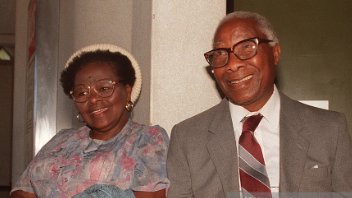Epainette and Govan Mbeki were well-known anti-apartheid leaders and activists in South Africa.
Govan Mbeki, a member of the Xhosa ethnic group, was born in the Transkei region’s Nqamakwe district. Mbeki noticed the hardship urban black Africans experienced and the frequent police raids they faced while working as a newsboy and messenger as a youngster. He attended Fort Hare University, earning a teaching credential and a Bachelor of Arts degree in politics and psychology in 1936. Mbeki interacted with other African resistance figures while he was a student.
Epainette belonged to the Bafokeng, more especially the Mahoona clan, who were among the first agro-pastoralists to settle in Lesotho. They are traditional healers. She was the sixth of seven children born to Eleazar Jakane Moerane and his wife Sofi Majara at Mount Fletcher in the Drakensberg. Her grandparents were followers of Moshoeshoe I and among the earliest Basotho converts to Christianity. Her parents belonged to the Paris Evangelical Missionary Society Church and owned land in Africa.
The Khanyisa beadwork initiative, which has preserved traditional African beadwork and given 24 Ngcingwanean women a means of subsistence, was the idea of painette Mbeki. She was connected with the Linda Mbeki Hospice, which was established to honor the life of her daughter, who passed away in 2003, and now runs out of the former Mbeki residence in Mbewuleni. Mbeki founded the Nomaka Mbeki Technical Senior Secondary School and was the owner of the Goodwill Trading Store, which she ran herself and conducted the cash-counting and bookkeeping for.
Nelson Mandela’s close friend Govan Mbeki was a founding member of the South African Communist Party. He participated in a number of political organizations, such as the African National Congress, and was prominent in the anti-apartheid campaign (ANC). He was one of the key protagonists in the anti-apartheid struggle and spent more than twenty years in prison for his political actions. He continued to participate actively in South African politics after his release from custody and was well-respected as a sage and foresighted leader.
Educator and political activist Epainette Mbeki, popularly known as MaNtuli, was active in the anti-apartheid movement.
She was well-known for her steadfast commitment to social justice and equality and was a prominent member of the ANC Women’s League. She participated actively in a number of political groups and was a strong supporter of South Africans’ overall and women’s rights.
Both Govan and Epainette Mbeki have admired leaders in the struggle against apartheid who were admired for their bravery, dedication to justice, and steadfast support for the rights of all South Africans. New generations of South Africans are still motivated by their legacy to work toward establishing a more just and equitable society.

